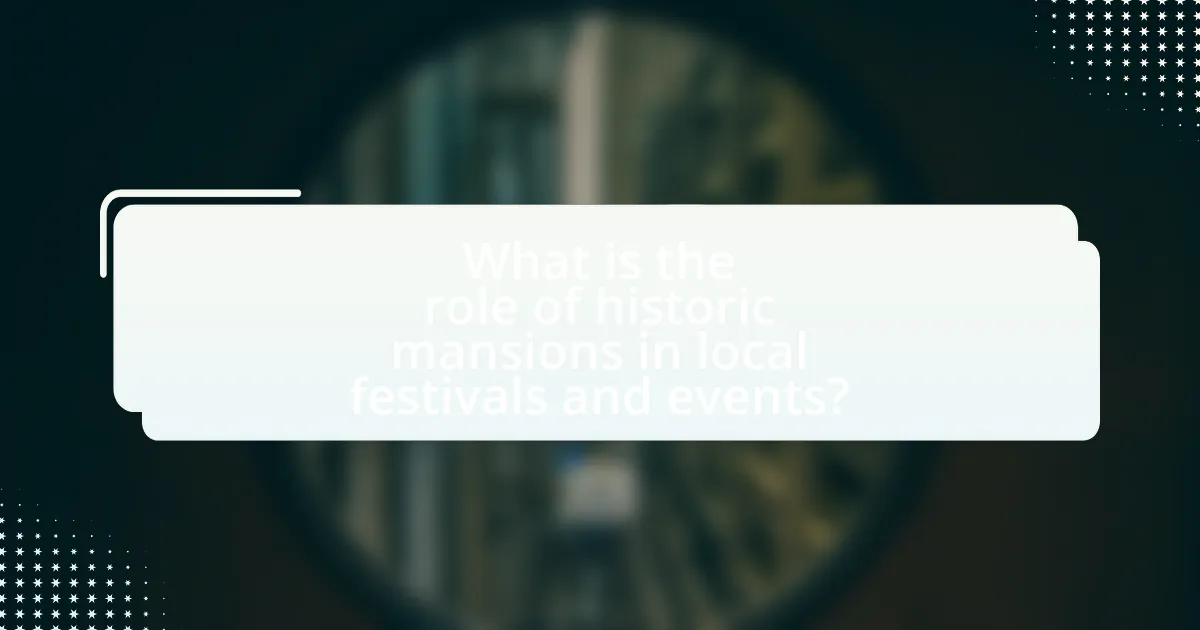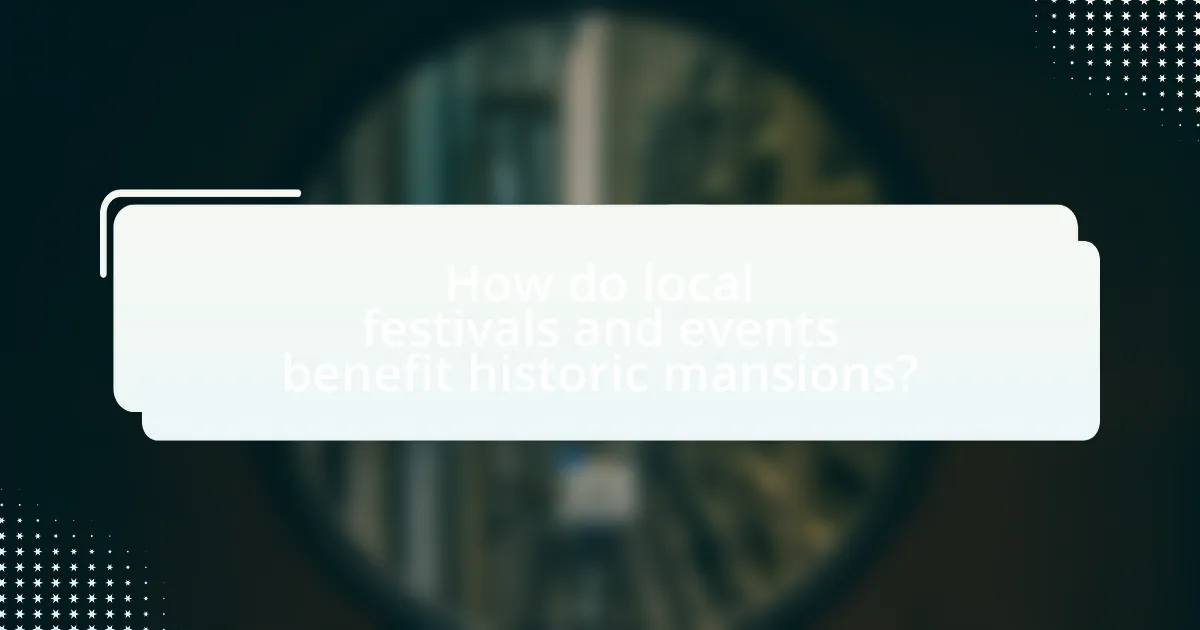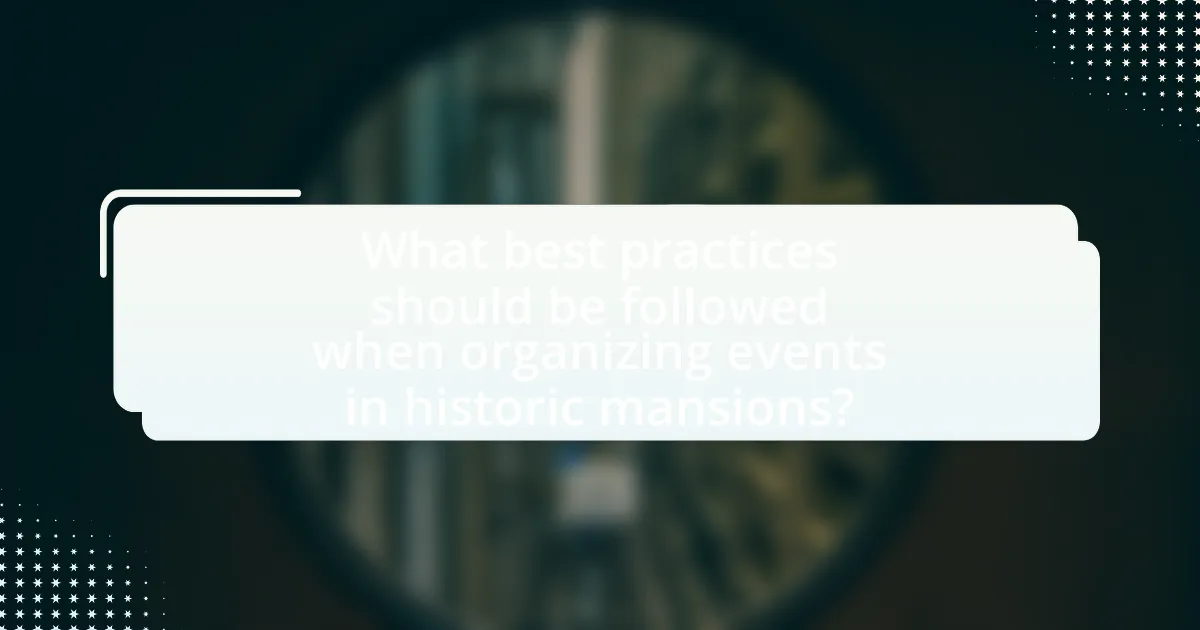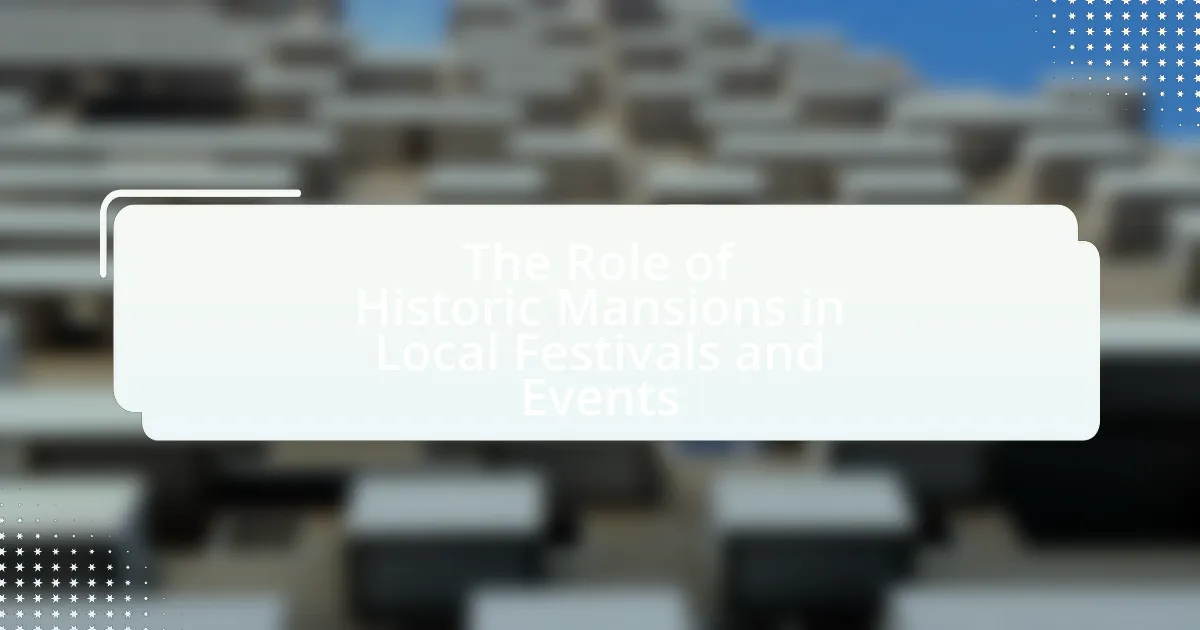Historic mansions play a crucial role in local festivals and events by serving as unique venues that enhance cultural experiences and foster community pride. These architectural landmarks host a variety of activities, including art exhibitions, historical reenactments, and seasonal celebrations, which attract visitors and stimulate local economies. The historical significance and aesthetic appeal of these mansions contribute to the overall atmosphere of events, making them more engaging and memorable. Additionally, the involvement of historic mansions in community gatherings promotes preservation efforts and increases public awareness of local heritage.

What is the role of historic mansions in local festivals and events?
Historic mansions serve as significant venues for local festivals and events, providing a unique backdrop that enhances cultural experiences. These architectural landmarks often host activities such as art exhibitions, historical reenactments, and community gatherings, attracting visitors and fostering local pride. For instance, many historic mansions are utilized for seasonal celebrations, like holiday tours or summer fairs, which can increase tourism and stimulate the local economy. Their historical significance and aesthetic appeal contribute to the overall atmosphere of these events, making them more engaging and memorable for participants.
How do historic mansions contribute to the cultural significance of local festivals?
Historic mansions enhance the cultural significance of local festivals by serving as venues that embody historical heritage and community identity. These structures often host festival activities, providing a backdrop that connects attendees to the region’s history and traditions. For instance, many local festivals utilize historic mansions for events such as art exhibitions, performances, and community gatherings, which foster a sense of belonging and continuity among residents. Additionally, the architectural features and historical narratives associated with these mansions enrich the festival experience, allowing participants to engage with the local culture in a meaningful way. This connection is evident in festivals that celebrate local history, where mansions are often highlighted in tours or as focal points for storytelling, thereby reinforcing their role as cultural landmarks.
What historical features of mansions enhance festival experiences?
Historical features of mansions, such as architectural styles, period furnishings, and landscaped gardens, significantly enhance festival experiences by providing a unique and immersive atmosphere. These elements create a visually captivating backdrop that transports attendees to a different era, enriching their engagement with the event. For instance, the grandeur of Victorian architecture or the elegance of Georgian design can evoke a sense of nostalgia and appreciation for history, making festivals more memorable. Additionally, period furnishings and decor can be used to create themed experiences that align with the festival’s purpose, further deepening the connection between the event and its historical context.
How do local communities perceive the involvement of historic mansions in events?
Local communities generally perceive the involvement of historic mansions in events positively, viewing them as valuable cultural assets that enhance community identity and pride. Historic mansions often serve as venues for festivals, weddings, and cultural gatherings, which foster social interaction and community engagement. Research indicates that events held in these settings can increase local tourism and economic activity, as seen in studies conducted by the National Trust for Historic Preservation, which highlight the economic benefits of heritage tourism. Additionally, community members often appreciate the aesthetic and historical significance of these mansions, reinforcing their desire to preserve such landmarks for future generations.
Why are historic mansions chosen as venues for local events?
Historic mansions are chosen as venues for local events primarily due to their unique architectural beauty and historical significance. These properties often provide a picturesque setting that enhances the aesthetic appeal of events, making them more memorable for attendees. Additionally, many historic mansions are equipped with spacious interiors and gardens, allowing for a variety of event types, from weddings to corporate gatherings. The cultural heritage associated with these venues often attracts local communities, fostering a sense of pride and connection to the past. Furthermore, hosting events in such locations can support preservation efforts, as rental fees often contribute to the maintenance and restoration of these historic sites.
What unique attributes do historic mansions offer compared to other venues?
Historic mansions offer unique attributes such as architectural grandeur, rich historical significance, and distinctive ambiance that set them apart from other venues. Their intricate designs often reflect specific historical periods, providing an aesthetic that enhances events with a sense of elegance and nostalgia. Additionally, many historic mansions have storied pasts, often linked to notable figures or events, which can add a layer of intrigue and cultural value to gatherings. For example, venues like the Biltmore Estate in North Carolina, built in the late 19th century, not only showcase opulent architecture but also host events that celebrate their historical context, making them more than just a location but a part of the narrative of the community.
How does the architecture of historic mansions influence event planning?
The architecture of historic mansions significantly influences event planning by dictating the layout, ambiance, and capacity of the venue. For instance, the grand staircases and expansive ballrooms typical of these structures create a formal atmosphere ideal for weddings and galas, while intricate architectural details enhance the aesthetic appeal, making them attractive for photography and branding. Additionally, the historical significance and unique design elements often dictate specific themes or styles for events, aligning them with the mansion’s character. This architectural context can also affect logistical considerations, such as accessibility and catering arrangements, as many historic mansions may have limitations due to their age and design.
What types of events are commonly held in historic mansions?
Historic mansions commonly host weddings, corporate events, art exhibitions, and private parties. These venues provide a unique and elegant backdrop, attracting clients seeking a distinctive atmosphere. For instance, many historic mansions are equipped with expansive gardens and grand ballrooms, making them ideal for wedding ceremonies and receptions. Additionally, their historical significance often draws organizations to hold corporate retreats and networking events, leveraging the ambiance to enhance guest experiences. Art exhibitions frequently take place in these settings, as the architecture complements the artistic displays, creating a culturally enriching environment.
How do seasonal festivals utilize historic mansions for celebrations?
Seasonal festivals utilize historic mansions as venues for celebrations by leveraging their architectural beauty and historical significance to enhance the festive atmosphere. These mansions often serve as backdrops for various activities, including themed parties, guided tours, and cultural performances, which attract visitors and foster community engagement. For instance, many festivals incorporate the unique features of these mansions, such as gardens and ballrooms, to create immersive experiences that reflect the season’s spirit. Additionally, the historical context of the mansions adds educational value, allowing attendees to learn about local heritage while enjoying the festivities. This combination of aesthetic appeal and cultural enrichment makes historic mansions ideal for seasonal celebrations.
What role do historic mansions play in community gatherings and ceremonies?
Historic mansions serve as significant venues for community gatherings and ceremonies, providing a unique blend of historical ambiance and cultural heritage. These properties often host events such as weddings, anniversaries, and local festivals, which foster community engagement and social cohesion. For instance, many historic mansions are equipped with expansive gardens and grand ballrooms, making them ideal for large gatherings. Additionally, their architectural significance often attracts visitors, enhancing local tourism and economic activity. The preservation of these mansions also reflects a community’s commitment to its history, as seen in numerous towns where such venues are central to annual celebrations and cultural events.
How do historic mansions enhance the overall experience of local festivals?
Historic mansions enhance the overall experience of local festivals by providing a unique and atmospheric backdrop that enriches cultural celebrations. These architectural landmarks often embody historical significance, showcasing local heritage and attracting visitors who appreciate their aesthetic and cultural value. For instance, during festivals, mansions may host events such as art exhibitions, historical reenactments, or themed parties, which engage attendees and deepen their connection to the community’s history. Additionally, the grandeur of these structures often elevates the festival’s ambiance, making it more memorable and visually appealing. The integration of historic mansions into festival activities not only promotes tourism but also fosters a sense of pride among local residents, reinforcing community bonds and cultural identity.
What challenges do organizers face when using historic mansions for events?
Organizers face several challenges when using historic mansions for events, primarily related to preservation regulations, logistical constraints, and accessibility issues. Preservation regulations often limit modifications to the property, making it difficult to accommodate modern event needs such as audio-visual equipment or large gatherings. Logistical constraints arise from the layout and age of the buildings, which may not support efficient flow for guests or necessary services like catering. Additionally, accessibility issues can hinder participation for individuals with disabilities, as many historic mansions lack the necessary infrastructure, such as ramps or elevators, to ensure compliance with modern accessibility standards.
How can preservation concerns impact event planning in historic mansions?
Preservation concerns significantly impact event planning in historic mansions by imposing restrictions on modifications and usage of the property. These restrictions often require event planners to adhere to specific guidelines that protect the architectural integrity and historical significance of the mansion. For instance, planners may need to avoid using certain materials or equipment that could damage original features, such as flooring or wall finishes. Additionally, local preservation laws may limit the types of events that can be held, influencing the scale and nature of gatherings. This adherence to preservation standards ensures that the mansion remains a viable cultural resource for future generations, as evidenced by the National Historic Preservation Act, which emphasizes the importance of maintaining historic properties.
What logistical issues arise when hosting events in historic properties?
Hosting events in historic properties presents several logistical issues, primarily related to accessibility, preservation concerns, and regulatory compliance. Accessibility can be challenging due to the often limited infrastructure, such as narrow doorways and staircases, which may hinder the movement of guests and equipment. Preservation concerns arise as event organizers must ensure that the property’s historical integrity is maintained, which can restrict the types of decorations and modifications allowed. Regulatory compliance is another significant issue, as historic properties are often subject to strict local, state, and federal regulations regarding safety, noise levels, and usage, which can complicate event planning and execution.

How do local festivals and events benefit historic mansions?
Local festivals and events benefit historic mansions by increasing public engagement and generating revenue for maintenance and preservation. These gatherings attract visitors who may not otherwise explore the mansion, leading to heightened awareness of its historical significance. For example, events like holiday tours or cultural festivals can draw thousands of attendees, resulting in ticket sales and donations that directly support the mansion’s upkeep. Additionally, local festivals often highlight the mansion’s architectural features and historical context, fostering community pride and encouraging further investment in preservation efforts.
What economic advantages do festivals bring to historic mansions?
Festivals bring significant economic advantages to historic mansions by increasing visitor traffic and generating revenue through ticket sales, concessions, and merchandise. For instance, a study by the National Trust for Historic Preservation found that events held at historic sites can boost local economies by attracting thousands of attendees, which in turn supports local businesses such as hotels, restaurants, and shops. Additionally, festivals often require the hiring of local vendors and service providers, further stimulating economic activity in the area. This influx of visitors not only enhances the financial sustainability of the mansions but also promotes their preservation and maintenance through increased funding and community support.
How do events increase visitor engagement with historic mansions?
Events increase visitor engagement with historic mansions by creating immersive experiences that attract diverse audiences. These events often include guided tours, themed activities, and interactive exhibits that allow visitors to connect with the mansion’s history and architecture. For instance, special events like historical reenactments or seasonal festivals can draw larger crowds, enhancing the mansion’s visibility and relevance in the community. Research indicates that venues hosting events see a significant increase in foot traffic; for example, a study by the National Trust for Historic Preservation found that historic sites that actively participate in local events experience up to a 30% increase in visitor numbers during those periods. This engagement fosters a deeper appreciation for the mansion’s cultural significance and encourages repeat visits.
What funding opportunities arise from hosting events in historic properties?
Hosting events in historic properties can generate funding opportunities through grants, sponsorships, and increased tourism revenue. Grants are often available from government and nonprofit organizations aimed at preserving cultural heritage, such as the National Trust for Historic Preservation, which provides financial support for events that promote historic sites. Sponsorships from local businesses can also arise, as they seek to align their brand with community heritage and attract customers. Additionally, hosting events can boost local tourism, leading to increased spending in the area, which can further support the maintenance and preservation of historic properties. For instance, a study by the National Park Service found that heritage tourism can significantly contribute to local economies, demonstrating the financial benefits of utilizing historic venues for events.
How do festivals promote the preservation of historic mansions?
Festivals promote the preservation of historic mansions by increasing public awareness and generating financial support for their maintenance. When festivals are held at these sites, they attract visitors who contribute to the local economy, often leading to increased funding for restoration projects. For example, the National Trust for Historic Preservation reports that events held at historic sites can raise significant funds, which are then allocated for preservation efforts. Additionally, festivals often include educational components that highlight the historical significance of the mansions, fostering a sense of community pride and encouraging local stakeholders to invest in their upkeep.
What role do community partnerships play in maintaining historic properties?
Community partnerships are essential for maintaining historic properties as they provide resources, expertise, and local engagement necessary for preservation efforts. These collaborations often involve local governments, non-profit organizations, and community members who contribute funding, volunteer labor, and advocacy for the protection of historic sites. For instance, studies have shown that properties maintained through community partnerships benefit from increased public awareness and support, leading to successful fundraising initiatives and volunteer programs that directly contribute to restoration and upkeep. This collaborative approach not only ensures the physical preservation of historic properties but also fosters a sense of community ownership and pride, which is vital for their long-term sustainability.
How can events raise awareness about the importance of preservation?
Events can raise awareness about the importance of preservation by showcasing historic mansions as cultural landmarks that embody local heritage. Through guided tours, educational workshops, and interactive exhibits, events provide attendees with firsthand experiences that highlight the architectural significance and historical narratives of these properties. For instance, a study by the National Trust for Historic Preservation indicates that community events centered around historic sites can increase public engagement and foster a sense of stewardship among participants. By connecting people emotionally to their local history, events effectively promote the value of preserving these irreplaceable assets for future generations.
What are the long-term impacts of events on historic mansions?
The long-term impacts of events on historic mansions include increased public awareness, financial sustainability, and preservation challenges. Historic mansions often serve as venues for local festivals and events, which can enhance their visibility and attract visitors, leading to greater community engagement and support for preservation efforts. For instance, events can generate revenue through ticket sales and donations, which can be reinvested into maintenance and restoration projects. However, frequent use for events may also lead to wear and tear, necessitating ongoing conservation efforts to maintain structural integrity and historical authenticity. Studies have shown that properties actively involved in community events tend to receive more funding and volunteer support, highlighting the dual nature of benefits and challenges associated with their use as event spaces.
How do successful festivals influence future event planning in historic venues?
Successful festivals significantly influence future event planning in historic venues by establishing best practices and showcasing the potential of these locations for large-scale gatherings. When a festival demonstrates effective crowd management, logistical efficiency, and community engagement, it sets a benchmark for subsequent events. For instance, the annual Newport Jazz Festival, held at the historic Fort Adams State Park, has successfully utilized the venue’s unique architecture and scenic views, leading to increased interest in hosting similar events at historic sites. This success encourages event planners to replicate effective strategies, such as utilizing local vendors and promoting cultural heritage, thereby enhancing the appeal and viability of historic venues for future events.
What lessons can be learned from past events held in historic mansions?
Past events held in historic mansions demonstrate the importance of preserving cultural heritage while fostering community engagement. These events often highlight the architectural significance and historical narratives associated with the mansions, reinforcing local identity. For instance, the use of historic mansions for festivals can attract tourism, as seen in the annual events at the Biltmore Estate, which draw thousands of visitors and generate significant economic impact. Additionally, organizing events in these venues can promote collaboration among local businesses and artists, enhancing community ties and supporting the local economy.

What best practices should be followed when organizing events in historic mansions?
When organizing events in historic mansions, it is essential to prioritize preservation and compliance with regulations. Historic mansions often have specific guidelines to protect their architectural integrity and historical significance, which must be adhered to during event planning. For instance, obtaining necessary permits and ensuring that any modifications or installations do not damage original features is crucial. Additionally, engaging with local heritage organizations can provide insights into best practices and compliance requirements. By following these guidelines, event organizers can ensure that the mansion’s historical value is maintained while hosting successful events.
How can event planners ensure the preservation of historic integrity?
Event planners can ensure the preservation of historic integrity by adhering to guidelines that respect the original architecture and cultural significance of the venue. This includes conducting thorough research on the history and architectural features of the historic mansion, consulting with preservation experts, and obtaining necessary permits that align with local preservation laws. For instance, the Secretary of the Interior’s Standards for the Treatment of Historic Properties provides a framework for maintaining the authenticity of historic sites during events. By following these standards, planners can protect the integrity of the site while still accommodating modern event needs.
What guidelines should be followed to protect historic features during events?
To protect historic features during events, organizers should implement guidelines that include conducting a thorough assessment of the site, ensuring minimal physical impact, and using protective barriers. A site assessment identifies vulnerable areas and informs planning, while minimizing physical impact involves limiting heavy equipment and foot traffic in sensitive zones. Protective barriers, such as temporary fencing, safeguard historic elements from damage. These practices are supported by preservation standards established by organizations like the National Trust for Historic Preservation, which emphasize the importance of maintaining the integrity of historic sites during public events.
How can planners balance modern needs with historical preservation?
Planners can balance modern needs with historical preservation by integrating contemporary design elements that respect and enhance the historical context of the site. This approach involves conducting thorough assessments of the historical significance of the structures and ensuring that any new developments complement the architectural style and cultural heritage. For instance, adaptive reuse of historic mansions for modern functions, such as event spaces or community centers, allows for contemporary use while maintaining the integrity of the original design. Studies show that communities that successfully blend modern needs with historical preservation often see increased tourism and local engagement, as evidenced by the revitalization of historic districts in cities like Savannah, Georgia, where preservation efforts have led to a 20% increase in tourism revenue.
What strategies can enhance visitor experience at events in historic mansions?
To enhance visitor experience at events in historic mansions, implementing immersive guided tours is essential. These tours can provide historical context and personal stories related to the mansion, engaging visitors on a deeper level. For instance, research by the National Trust for Historic Preservation indicates that interactive experiences significantly increase visitor satisfaction and retention. Additionally, incorporating themed events that reflect the mansion’s history, such as period-specific dinners or reenactments, can create memorable experiences that resonate with attendees. Furthermore, utilizing technology, such as augmented reality apps, can offer visitors a unique perspective on the mansion’s architecture and artifacts, enhancing their overall experience.
How can interactive elements be incorporated into events to engage attendees?
Interactive elements can be incorporated into events by utilizing technology, hands-on activities, and immersive experiences to engage attendees. For instance, incorporating mobile apps that allow attendees to participate in live polls or quizzes during presentations can enhance interaction and provide real-time feedback. Additionally, setting up interactive stations where attendees can create art or craft related to the event theme fosters engagement and personal connection. Historical reenactments or guided tours with actors in period costumes can also immerse attendees in the event’s context, making the experience more memorable. Research indicates that events featuring interactive components see a 30% increase in attendee satisfaction, highlighting the effectiveness of these strategies in enhancing engagement.
What role does storytelling play in enhancing the festival experience at historic sites?
Storytelling plays a crucial role in enhancing the festival experience at historic sites by creating emotional connections and providing context to the location’s history. This narrative framework allows visitors to engage more deeply with the site, transforming their experience from passive observation to active participation. For instance, festivals at historic mansions often incorporate tales of past inhabitants, significant events, or local folklore, which enrich the atmosphere and foster a sense of belonging among attendees. Research indicates that immersive storytelling can increase visitor satisfaction and retention, as it helps individuals relate personally to the history being presented, thereby making the festival more memorable and impactful.
What resources are available for successful event planning in historic mansions?
Successful event planning in historic mansions can utilize various resources, including venue management services, catering companies specializing in historic settings, and event planning software tailored for unique venues. Venue management services often provide insights into the specific requirements and restrictions of historic properties, ensuring compliance with preservation guidelines. Catering companies experienced in working within these settings can offer menus that complement the ambiance and history of the mansion. Additionally, event planning software can assist in organizing logistics, guest lists, and timelines, making the planning process more efficient. These resources collectively enhance the ability to host memorable events that respect the historical significance of the venue.
How can planners access historical information to enrich event themes?
Planners can access historical information to enrich event themes by utilizing archives, libraries, and online databases that specialize in local history. These resources often contain documents, photographs, and records that detail the significance of historic mansions and their roles in community events. For example, the National Register of Historic Places provides detailed descriptions and historical context for listed properties, which can inform thematic elements of events held at these locations. Additionally, local historical societies frequently offer curated materials and expert insights that can enhance the understanding of the cultural heritage associated with specific venues.
What local organizations can assist in event planning at historic mansions?
Local organizations that can assist in event planning at historic mansions include historical societies, local chambers of commerce, and event planning companies specializing in heritage venues. Historical societies often have resources and expertise in managing events at historic sites, ensuring compliance with preservation guidelines. Local chambers of commerce can provide networking opportunities and support for promoting events, while specialized event planning companies can offer tailored services that align with the unique characteristics of historic mansions. These organizations collectively enhance the planning process by leveraging their knowledge of local history and event logistics.

Leave a Reply